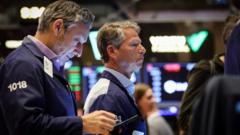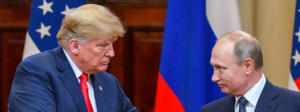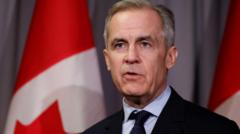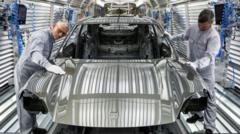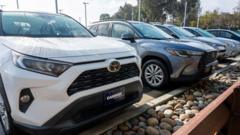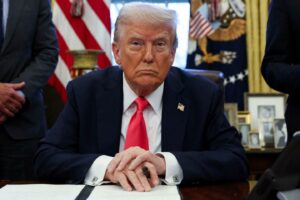"As the implementation of significant auto tariffs approaches, American car buyers and dealers express concern about soaring vehicle prices and the uncertain economic impact. The tariffs, set to start next week, could disrupt the auto market, aggravate existing financial pressures on consumers, and challenge the long-standing interconnectedness of the North American auto industry."
"American Car Buyers Face Uncertain Future Amid Looming Auto Tariffs"

"American Car Buyers Face Uncertain Future Amid Looming Auto Tariffs"
"Consumers across the U.S. are on edge as President Trump's 25% tariffs on foreign cars and parts threaten to drive up prices and alter market dynamics."
American car buyers are bracing for significant changes as President Donald Trump's 25% tariffs on imports of foreign cars and parts are set to take effect soon. The tariffs, which are expected to impact vehicle pricing significantly, have led individuals like Jeannie Dillard from Virginia to reconsider their car purchasing plans. Having saved for two years to replace her stolen vehicle, Dillard stated, "If prices get too high, I'm obviously not going to buy something that I can't afford."
With a policy many see as unprecedented, the Trump administration asserts that the tariffs will catalyze growth and create job opportunities within the U.S. However, industry analysts and auto manufacturers predict a sharp increase in consumer prices, further straining a sluggish economy. Mohamad Husseini, a used car dealership co-owner in Maryland, forecasts drastic price hikes, stating, “The prices in the wholesale market have skyrocketed already. It's going to get worse.” Husseini believes that a vehicle priced at $13,000 could rise to as much as $14,500 due to added tariffs.
Buyers are already reacting to the impending tariff changes. Car shoppers like Robin Sloan are adjusting their timelines, eager to purchase a vehicle before potential price hikes take place. Sloan expressed skepticism regarding the administration's claim that tariffs will push consumers to buy American vehicles, indicating instead a preference to wait for the economic situation to stabilize.
The automotive market in the U.S. is vast, with roughly 92% of households owning a car. Such ownership is deeply embedded in American culture, seen not just as a means of transportation but also as a symbol of freedom and success. With this cultural significance, experts like John Heitmann, an automotive historian, warn that the tariffs may disproportionately affect lower-income buyers who are already struggling to afford new vehicles.
Additionally, the tariffs are anticipated to not only affect foreign automobiles but also U.S.-made cars, as parts for assembly frequently cross borders among Canada, Mexico, and the U.S. The complexity of supply chains means that price increases could ripple through all vehicles, even those marketed as "American."
Recent statistics suggest that the proposed tariffs could slash imports by nearly 75%, pushing average prices up by an estimated 5%. While some automakers, such as Hyundai, respond positively by investing in U.S. operations, others warn against the long-term repercussions of Trump's tariffs, emphasizing the potential unpredictability and instability within the market.
As the deadline approaches for the implementation of these tariffs, many Americans, like Mya Fountain-Bunch, seek to delay purchasing decisions or ensure that their current vehicles remain functional amid economic uncertainty. “I’m making sure that my car is working and hopefully I won't have to buy another car in the next few years,” she remarked, encapsulating the mood of many in a nation standing on the brink of automotive market upheaval.


